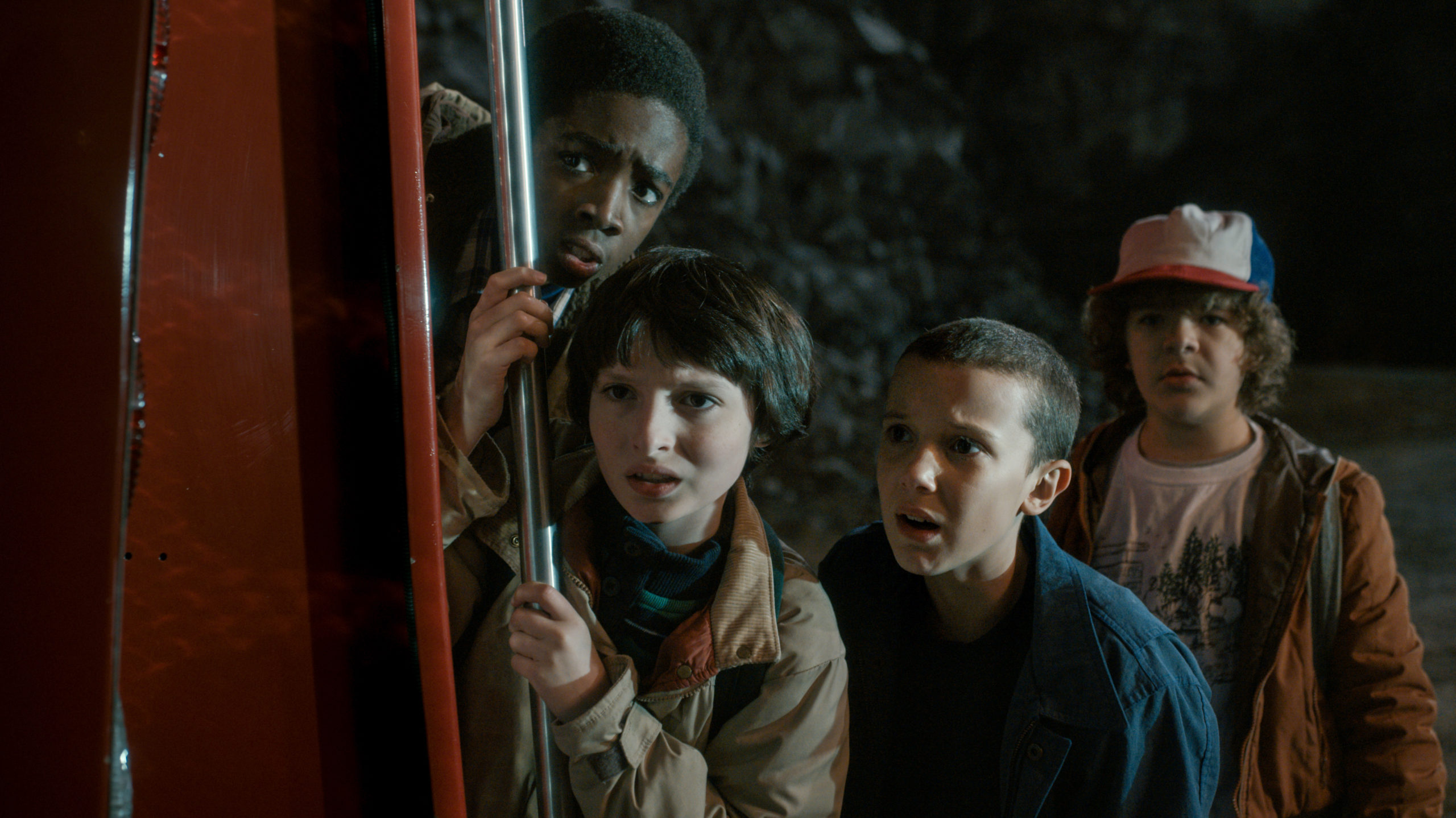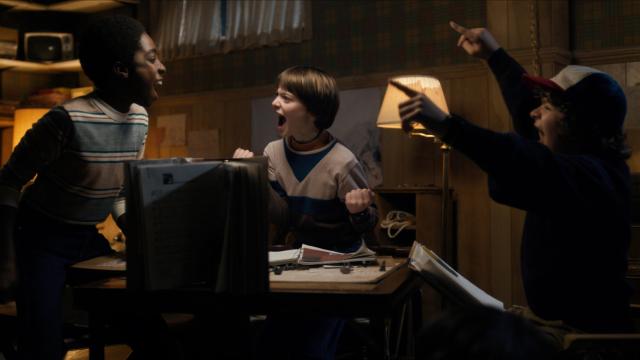One of the first scenes in Stranger Things is the nerdiest imaginable: Four boys — maybe around 11 or 12 — sitting around a table playing Dungeons & Dragons. And they are loving it.
Courtesy Netflix

The dungeonmaster, Mike, puts out monster after monster, knowing it’s a task that his friends probably won’t able to conquer. Will, the smallest one, doesn’t know what spell to cast. Dustin, to his right, yells at him to cast fireball, but he’ll have to roll a 14 in order to hit. Another voice in his ear tells him to throw up a protection spell. Will can’t decide, and their session is broken up before they see if they were able to defeat the dreaded, multi-headed demogorgon.
Of course, the audience doesn’t realise at the time that this campaign is foreshadowing for what is set to tear this group apart, but for the moment, it tells you everything you need to know about the characters, the 1980s and the show you’re about to watch. It shows how the writers connect with the references and the passion they have for a decades-old board game.
It also gives you the time to sit for a second and think about your first time playing D&D, or what you were doing at 12 with your nerdy friends.
The first one is easy. My first time playing D&D was two months ago. I was dropped into a campaign already in progress. I rolled a dwarf monk because I thought it would be funny. She was a short redhead who spends most of the time running around, punching rocks and drinking beer while the rest of her teammates perform complex spells and shapeshift into tigers, which she will gladly ride. It’s not a bad time.
I think a lot about who I was at 12, though. I had bangs, glasses and braces. I wore huge sweaters and baggy jeans and slung around a ratty messenger bag and wore Converse hightops because I thought I would look cooler. I surrounded myself with a few people so my mother wouldn’t worry I didn’t have any, but they thought it was amusing that I watched anime or liked the X-Men.
I didn’t have anybody to play D&D with.
A popular nickname for me was “freak”, which I heard quite often from my friends. I would briefly mention anything remotely geeky — how I spent a good portion of my weekend playing Half-Life or watching pirated, poorly translated copies of anime such as Yu Yu Hakusho — and they would squint their eyes in confusion and laugh.
“You’re my freak,” one of my friends used to tell me. She wrote it on my birthday cards. It was a term of endearment.
Nowadays, I have people to tolerate my rants, but kids are mean. When I was eight years old, I used to play Pokemon at recess with a few of the boys in my class, but I was teased enough that I stopped asking my mum to buy me card packs. In my teens I started using the internet to read comics, which was fine with me because I wasn’t going to ask anyone to come with me to buy some. My mother called my strange interests a “phase”.
I know a lot of this fear was insecurity concerning the people I surrounded myself with. My high school was full of nerds that I was too afraid to socialise with. I didn’t want to stand out, and I certainly didn’t want to get teased even more by my friends. There were people, over the years, that reached out, inviting me to the movies or to comic book conventions, but I just kind of kept quiet.
I opted to sit alone in my bedroom, sneaking anime with my sister or watching horror movies or X-Files reruns that I taped off the television. I ate cereal on the weekends watching the last remnants of Saturday morning cartoons and sat less than content.

Babbies. Courtesy Netflix
At first, you take this group of four boys in Stranger Things for granted, looking at them like a separated nostalgic throwback and reference rather than characters. It’s presented as such, with the mum coming in to break up the game and Mike’s family teasing him a bit for his hobby. The 1980s did see the rise of the nerd in Revenge of the Nerds and Weird Science, for instance, but even in the plots where the nerd was deemed the hero, he was still treated as lesser than the rest.
It remains the same for a decent portion of the series. Even as the group attempts to deal with the disappearance of their friend Will, the bullies are forever present to push them into the ground and humiliate them. However, over time you learn the intricacies of the characters around them and you grow attached to the core group as people. Even with the addition of the telekinetic Eleven and all the drama that nearly forces them apart, the dynamic always snaps back to what we saw in that first scene, with the D&D game.
There’s an enthusiasm that shines when the core characters are around each other. And when the plot turns to the truth behind Will’s absence, the motivation remains insular. These are kids that want to be with their friends, and who want to finish the D&D game they started.
As Eleven tries to adjust to the world outside where she came from, she is still reaching out in her own way to these boys. Mike is, of course, smitten, but cares for her. He’s almost like her nerd gateway, helping her to understand the culture and his hobbies in the only way he knows how. He shows her the D&D board, his Millennium Falcon model, his walkie-talkie, all in an attempt to introduce her to his world. The other two boys, Dustin and Lucas, are wary throughout the series of her abilities and what she knows, but also try and be open. Everyone in this group is an outsider, and outsiders have to stick together.
What makes Stranger Things so appealing are the references and tributes to 1980s camp and horror that are done so well, but more importantly, the ways every character, not just this core group, connect following tragedy. As the town is turned upside-down, people who barely spoke come together. Mike’s sister Nancy teams up with Will’s brother Jonathan despite how he previously was caught sneaking photos of her (yes that’s still creepy). Will’s mother Joyce, in the final episode, walks close to the sheriff, who denied her warnings for the first half of the story. All of these disparate groups even come together at the end in a showdown that would only work if everyone played a part. Some play larger parts than others, but it’s ultimately a team effort. You can’t defeat the demogorgon without your party.
These were all people shown to have anxiety about others. Jonathan avoids his classmates; Nancy doesn’t know how to deal with attention from the popular kids and also balance her friendship with Barb; Joyce, in the wake of her son’s disappearance, is cast out even more from the town as her actions become more erratic. Eleven is the embodiment of this as she spends most of the series cowering away and staying quiet.
But when do we see this anxiety lift? The most impressive moment, besides all the character building that I can’t list here for brevity, is when, at the very end, the boys come back together for D&D and finally finish the campaign.
Stranger Things isn’t just a horror throwback, but a show that embodies the best parts of nerd culture. This role-playing game, for instance, is a binding agent. They relax people, bring them together, cast smiles on the characters’ faces even when things are bleak. The numerous references are there so that the audience can point and go “ah, I know that one,” but they serve a purpose. They’re all a part of the kids’ lives, and what makes them happy.
It’s why I smile when Mike, Will, Lucas and Dustin sit down together to finish their campaign and cheer when they win. Sure I wasn’t able to experience that togetherness until I was well into my 20s, but there were kids that did get that and that still are.
There’s a line where experiencing the nostalgia surrounding nerd culture becomes obnoxious — usually when the person acts like their experience is the unanimous one — but that doesn’t happen in Stranger Things. It’s all genuine and focuses on the kinship that arises when you meet people who accept you, not the knowledge you have. It shines a light on how things like D&D can help kids feel less alone. In the end, the game that bookends the series might be the least strange thing around.
